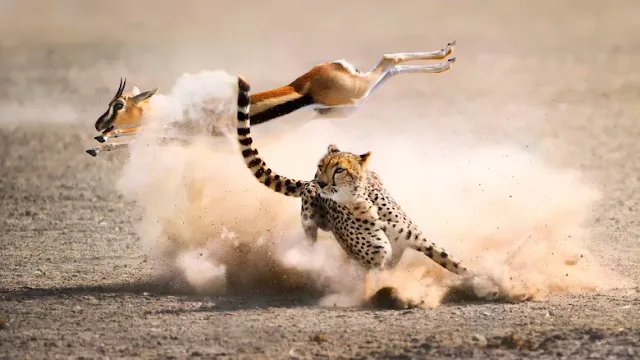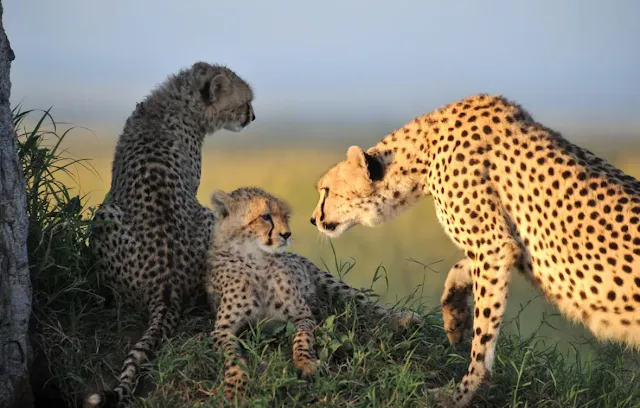From Johannesburg, 20 cheetahs will be transported to Kuno National Park,
where they will then be released into the wild.
In India, antelopes could be trembling in their split hooves as one of the
nation's top predators is about to make its comeback from extinction. 70
years after it was thought to be extinct in India, the swift and dangerous
cheetah will be brought back.
As It Happens guest presenter Paul Hunter was informed by Yadvendradev
Jhala, dean of the Wildlife Institute of India, "It's amazing to recover
back a lost bit of the legacy which we have lost owing to human
reasons."
"I've been working on it for about 20 years now," the speaker said.
As part of the reintroduction operations, 20 cheetahs will soon be shipped
from South Africa and Namibia to India. Veterinarians used
helicopter-launched tranquilizer darts to collect the majority of the cats
from the reserves.
There are valid reasons to maintain a safe distance. Even if you are
attempting to assist, you shouldn't approach a conscious cheetah too
closely.
The cats have since received antibiotic treatment, been microchipped, and
have undergone illness testing and vaccinations. As they wait to travel to
their new home, they are now in confined cages.
The cheetahs will fly by cargo from Johannesburg to Delhi before being
transported to Kuno National Park, a wildlife refuge in the Madhya Pradesh
state of India, according to the BBC.
The cheetahs will be held in captivity there for at least a month before
being released back into the wild.
And Jhala is eager to see the gorgeous animal in India once more after 20
years of working to save cheetahs.
"This amazing event has happened. One component of it is the speed, but
it's also impressive to see the animal for what it is, even if it's simply
strolling over the grassland "Jhala added.
Killed off by hunting
According to Jhala, the reason the cheetah disappeared from India's
grasslands is not a mystery. In an effort to protect the nation from
dangerous predators, citizens were granted bounties to kill the animals
while the country was ruled by the British.
Jhala stated that "the Eastern faiths view nature as something that is
under the custodianship of people."
When the British arrived, "the mentality of stewardship was gone and it
become predatory."
According to Jhala, the last cheetah was shot in 1947, the same year that
India gained independence from Britain. In the nation, the species was
regarded as extinct by 1952.
Jhala claims that with that person's passing, a crucial aspect of Indian
culture was gone.
"The term "cheetah" has Sanskrit roots. It was developed in India. … The
cheetah is mentioned in the ancient Vedas, which were written roughly 4,000
years ago. There are Neolithic male-made cave drawings, "Jhala
claimed.
"[The] Cheetah has played a significant role in Indian tradition, culture,
and religion as well."
India has already attempted to restore its cheetah population. India
suggested trading big cats with Iran in the 1970s; Iran would receive some
of India's lions in return for some Asiatic cheetahs.
However, discussions broke down once the last Shah of the Imperial State of
Iran was removed from power.
Following cheetah behavior
According to Jhala, the cheetahs' capacity to get it on will be crucial to
their effective introduction to their new habitat.
We anticipate that after they are freed, they will continue to do what
cheetahs do naturally—pair up, procreate, and give birth to other
cheetahs.
However, the endeavor won't be dependent simply on their union. Over the
next five years, Jhala intends to attract 35 to 50 people to India.
According to Jhala, "We want to capture the genetic diversity that is
present in these nations so that the Indian population is genetically
vigorous and we can develop a sustainable population in India."
The Indian antelope, which serves as the cheetah's primary food supply in
the region, may perceive this as bad news. Being the prey of the extremely
swift cats, however, has evolutionary advantages, according to Jhala.
"The weak individuals in the populations of prey are eliminated. Therefore,
it has played a crucial role in the development of herbivores. And that
power of evolution needs to be returned to how nature intended it to be, "He
said.
Tags:
animals




